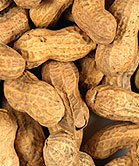- Could Your Grocery Store Meat Be Causing Recurring UTIs?
- Are You Making This Expensive Thermostat Error This Winter?
- Recognizing the Signs of Hypothyroidism
- 10 Strategies to Overcome Insomnia
- Could Artificial Sweeteners Be Aging the Brain Faster?
- Techniques for Soothing Your Nervous System
- Does the Water in Your House Smell Funny? Here’s Why
- Can a Daily Dose of Apple Cider Vinegar Actually Aid Weight Loss?
- 6 Health Beverages That Can Actually Spike Your Blood Sugar
- Treatment Options for Social Anxiety Disorder
Infants With Eczema May Be More Prone to Peanut Allergy: Study


Exposure to peanut protein in household dust may increase the risk of peanut allergy in infants with the skin condition eczema, a new study reveals.
About 2 percent of school-aged children in the United States are allergic to peanuts. And severe eczema in infants has been linked to food allergies, particularly peanut allergy, the researchers noted.
The new study included 359 infants aged 3 months to 15 months. The researchers examined the amount of peanut protein the children were exposed to in household dust. The children were at high risk for peanut allergy because they were allergic to cow’s milk or eggs, or had moderate to severe eczema and were allergic to cow’s milk or eggs.
The investigators found that exposure to peanut protein in household dust early in life doubled a child’s risk of peanut allergy. The risk was highest among children with eczema, according to the study published online Nov. 18 in the Journal of Allergy and Clinical Immunology.
“This study adds to the growing body of evidence that exposure to peanut via a damaged skin barrier may increase the risk of peanut allergy,” study first author Dr. Helen Brough, of the department of pediatric allergy at King’s College London, said in a college news release.
“Previous studies have shown, for example, that infants with eczema treated with creams containing peanut oil in the first six months of life had a higher risk of developing peanut allergy later in life,” Brough explained.
Study senior author Gideon Lack, also of King’s College London, added, “This is further evidence for the dual-allergen-exposure theory, which suggests food allergies develop through exposure to allergens via the skin, likely through a disrupted skin barrier, whilst consumption of these food proteins early in life builds up tolerance in the body.”
According to Lack, “Previous guidelines recommending that mothers should avoid peanuts during pregnancy and breast-feeding have now been withdrawn. It may be that the timing and balance of skin and oral exposure to a particular food early in life determines whether a child develops an allergy or tolerance to that food.”
More information
The U.S. National Institute of Allergy and Infectious Diseases has more about food allergy.
Source: HealthDay
Copyright © 2026 HealthDay. All rights reserved.










